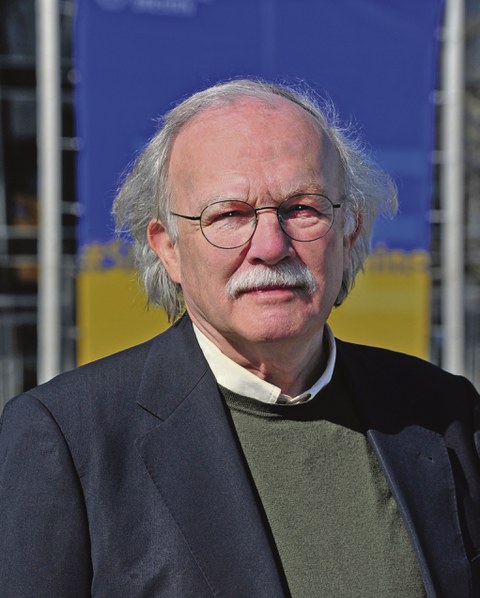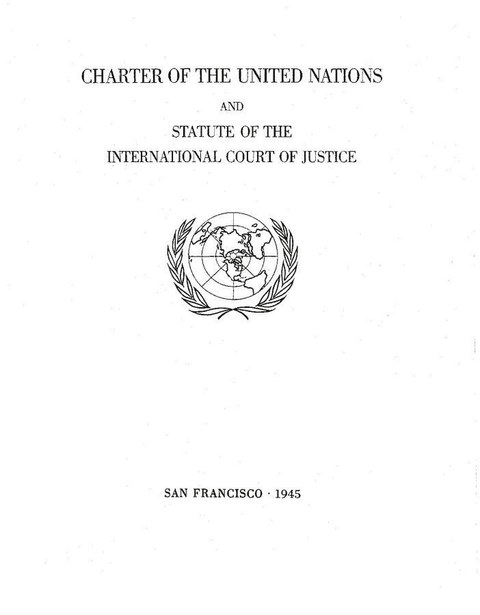Mar 29, 2022
“Disturbing insights into Putin’s marred idea of history”

Das Gebäude des Internationalen Strafgerichtshofs in Den Haag, Niederlande.
International law expert Prof. Ulrich Fastenrath in an interview with the Dresden University Newspaper
The research unit for International Law and State Theory at the Institute of International Law, Intellectual Property and Technology Law at TU Dresden, headed by Prof. Ulrich Fastenrath, is dedicated to fundamental questions relating to the concept of law and state, legal methodology, the interplay of German, international and European law, with the interdisciplinary inclusion of linguistics, philosophy and political science. This has resulted in numerous works on international human rights protection, the international system, the international power of the Federal Republic of Germany, all the way up to the legality of the missions of the German armed forces and the effect of international and European law in the context of national law, for example in connection with asylum and refugee law. The Dresden University Newspaper (UJ) spoke with Prof. Fastenrath about Russia’s current war against Ukraine. In a very short time, millions of people were forced to flee and are still fleeing from the violence perpetrated at the center of Europe against a sovereign country and its population, against its military and civilian infrastructure. How much, how extensively should Germany get involved - also in a militaristic sense - in the conflict? What would be the consequences of this and how would stronger involvement be covered by international law?

Prof. Ulrich Fastenrath.
UJ: Prof. Fastenrath, war has largely disappeared from the language of lawyers. Today, international lawyers talk about “armed conflicts”. Back in the early 2000s, you said yourself there has not been a single declaration of war since World War II, which, according to earlier understanding, had to be at the beginning of a war. But even today, “martial law” applies after the outbreak of a military conflict. Behind this are, above all, The Hague and Geneva Conventions that regulate the protection of civilians and the prohibition of certain weapons. How likely is it that Russia will comply with these rules?
Prof. Fastenrath: The wording doesn't really matter here. The technical term “armed conflict” under international law includes what is colloquially called “war”. And Russia may insist that this is a “special military operation”. To anyone who sees the pictures, the term “war” is the most befitting. This is why we should call what is currently happening in Ukraine a war. Language should make it clear what is meant, not trivialize or obfuscate it. Only when legal consequences are involved do we have to use the legal terminology. As for “martial law”, international peacetime law and martial law used to be regarded as two separate systems of rules. The transition from the former to the latter occurred through the declaration of war, and the peace treaty signaled the return to the international peacetime law. States could be in a state of war without a single shot having been fired; and they could fire at each other without being at war. Today, it is assumed that a uniform system of international law exists, which includes regulations on armed conflicts. However, their application no longer depends on declarations, nor on the words chosen, but on the facts: the use of military force.
Side question: Aren’t wars generally forbidden? Are there any exceptions?
Yes, under article 2 no. 4 of the United Nations Charter, the threat and use of force in international relations is generally prohibited. There are only two explicit exceptions to this in the Charter: the right to self-defense against an armed external attack under article 51 and coercive measures decided on or authorized by the UN Security Council under article 42. It is disputed whether foreign states can also intervene in a militaristic sense in the event of genocide or other serious human rights violations, i.e. whether there is a third exception to the prohibition to the use of force in the form of so-called humanitarian intervention. As to the reasoning behind the invasion of Ukraine, Vladimir Putin addressed the nation in a speech. Russia circulated this speech along with the required communication to the UN Security Council about the military operation. Such detailed explanations and justifications are a highly unusual (un)diplomatic procedure.
The legend of the oppressed people
Above all, however, this document provides disturbing insights into its author’s marred idea of history. The legend of an oppressed and threatened people is being created and, at the same time, the manifesto of a Russian-dominated hemisphere, which is worth defending even through war. Putin invokes the right to self-defense of Russia and the “People’s Republics” of Donetsk and Luhansk, which he wholeheartedly supports, based on an alleged genocide to which the population in these “People’s Republics” has been exposed for years. However, the document does not specify the actions of Ukraine that constitute an armed attack within the meaning of article 51 of the UN Charter or the basis for the genocide accusation. The violations of the ceasefire at the demarcation line by both the Ukrainian army and the militias of the “People’s Republics”, which have been going on for years and have been documented by the OSCE, are certainly not enough to justify this. They neither reached the level of an attack that triggers the right to self-defense, nor were they aimed at the extermination of a people. Accordingly, the UN General Assembly decided - with only five votes against (Belarus, Eritrea, North Korea, Russia, Syria) - that Russia must end the hostilities and withdraw from Ukraine. The International Court of Justice ruled in the same way. Ukraine had appealed to the International Court of Justice to establish that there was no genocide in the “People’s Republics” and that Russia could not justify a humanitarian intervention based on this.
Back to martial law. What rules are to be observed in an armed conflict and is Russia observing these?
Today, the rules of war are referred to - rather euphemistically - as international humanitarian law. The intention is to civilize military operations as far as possible. Named after the cities in which the relevant treaties were negotiated, a distinction is made between Hague law, which contains regulations on combat, and Geneva law, which contains regulations on the protection of non-combatant groups such as civilians, prisoners of war or the wounded. This separation in regulatory matters, however, no longer fits well. From what we have seen so far, Russia has not used prohibited weapons, such as chemical weapons, or treated prisoners of war unlawfully. It is, however, increasingly destroying the civilian infrastructure and apparently, more or less indiscriminately, shelling residential buildings, hospitals and schools. There is much to suggest that these are war crimes, although the details need to be clarified. The Prosecuting Authority of the International Criminal Court, as well as the German Attorney General are already investigating the matter.
Warring parties may also accept civilian casualties in their attacks - international law does not generally prohibit such “collateral damage”. It is true that the overriding principle is that only military targets may be attacked. But what about military infrastructure within cities or densely populated areas?
The starting point is the distinction requirement. Attacks may only be directed towards military targets, never towards civilian ones. In order to make this possible, a distinction requirement corresponds to the separation requirement: military facilities must be separated from civilian objects as far as possible. This is the only way to prevent an attack on a military target from almost inevitably causing civilian casualties. Such “collateral damage” - a terribly trivializing word considering that human lives are at stake - is to be accepted; a military operation is only unlawful if the civilian losses outweigh the military advantage sought. In this respect, defending cities from within the cities themselves is particularly dangerous. This allows the number of possible civilian casualties to skyrocket without legally preventing Russia from capturing such a city.
The number of military targets grows enormously
What remains dangerous is the call for all Ukrainian men to defend their country by force of arms. Potentially, the number of military targets grows enormously as a result: Anyone carrying a rifle or handling Molotov cocktails is one of them. Nevertheless, the shelling of residential areas, hospitals, schools and theaters remains a war crime. They only become a military target that could be permissibly attacked if Ukrainian soldiers or other armed groups are located there.

Die Charta der Vereinten Nationen.
Ukraine is repeatedly asking the West for support in its struggle, otherwise it has no chance of competing with Russia’s military potential. To what extent can Germany get involved without violating international law? Given its own NATO membership, what is even conceivable here - even if there is an overwhelming desire to help Ukraine?
International law is not a limiting factor here. Any state may come to the aid of a state under attack and fight alongside it against the aggressor. This kind of collective self-defense is permitted under article 51 of the United Nations Charter, even beyond military alliances or prior defense commitments.
The Constitution sets limits for the German armed forces
The German Constitution provides a delineation, the details of which are admittedly controversial. According to article 87a para 2 of the Constitution, the German armed forces may only be used for defense (which is now mostly understood to mean the defense of Germany) or to the extent that the constitution expressly permits. According to the jurisdiction of the Federal Constitutional Court, permissible actions include, in particular, alliance defense within the framework of NATO and the European Union, as well as peacekeeping within the framework of the UN peacekeeping missions (article 24, para 2, Constitution). Accordingly, German troops would only be allowed to intervene in combat if NATO decided to do so first. However, all measures below the threshold of a military operation are permitted, such as financial support and the supply of good of all kinds, including weaponry. The sale or provision of weapons does not directly involve a state in a war, just as Germany is not a party to the war on Russia’s side by continuing to pay for Russian gas and oil which it uses to fund its military action.
If the conflict between Russia and Ukraine is settled - hopefully soon - how can a future coexistence be ensured after Russia’s obvious violations of the international law of war? Classical peace treaties are, in your words, “out of fashion”.
A flippant remark! But it is true that the peace treaty that draws a line under the past, cuts off all mutual claims and responsibilities for whatever war atrocities have been committed and becomes the final basis for the future relationship between the warring parties, no longer exists. This only leaves partial settlements, such as the cessation of hostilities, the shifting or recognition of borders, arms limitations or whatever else is of particular importance to the warring parties and on which they can just about agree, taking into account the balance of power. Everything else remains unregulated and thus legally open. It then depends on future developments as to whether claims can be made and enforced against the former enemy. We know this from the Second World War. The restitution of looted art is still being negotiated - this has also affected the Staatliche Kunstsammlungen Dresden (Dresden State Art Collections). And some states, especially Poland and Greece, have demanded reparations from Germany, in the same way that individual Greeks and Italians have demanded compensation for war crimes of which they or their ancestors were victims.
Konrad Kästner spoke to Prof. Ulrich Fastenrath.
This interview was published on March 29, 2022 in issue 6 / 2022 of the Dresden University Newspaper: https://tu-dresden.de/uj
Contact:
Prof. Ulrich Fastenrath
Research Unit for International Law and State Theory
Institute of International Law, Intellectual Property and Technology Law
Technische Universität Dresden
Tel.: +49 351/463-37333
Cellphone (for journalists only!): +49 176 55101917
